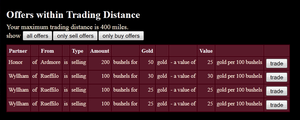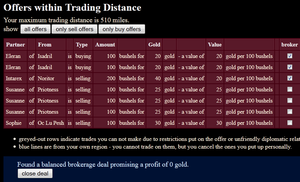Difference between revisions of "Trade"
m (→Why Trade?) |
(add screenshots. some other bits.) |
||
| (14 intermediate revisions by 4 users not shown) | |||
| Line 1: | Line 1: | ||
| − | + | This article describes the latest system currently deployed on all islands (as of 15/5/12). For the older and now obsolete article, please refer to [[Trade old]]. | |
| − | |||
| − | + | Trade is the business of buying and selling commodities. In the case of Battlemaster, the only tradable commodity is [[food]]. Trading is all about creating offers and fulfilling them. It can be a buy offer or it can be a sell offer. | |
| − | + | Only Region Lords and their appointed stewards can create offers. Trading (creation and fulfilling of offers) can only be done in regions with a marketplace, or in the region you are lord or steward of (even if it has no marketplace). | |
| − | + | A character can only see offers that are within trading range at the marketplace. Lords and Stewards can get access to markets (ie.. without having to build one) when they are in their home region. Obviously that is off limits to other lords/stewards/traders who happen to pass by the region and trading opportunities might be lost if there isn't a marketplace nearby. | |
| − | |||
| − | + | ==Region Lords and Stewards== | |
| + | [[File:Lord_or_steward.png|thumb|Example screenshot of direct trade. Simply click trade in the desired row to buy or sell.]] | ||
| + | Creating buy offers means you are advertising the fact that you are going to pay for a certain amount of food at a certain price to those with access to nearby marketplaces. You will also be putting in escrow the entire cost of the transaction in bonds (only) at the same time. | ||
| − | + | Lords and Stewards can create offers in their home region or in any marketplace. Lords and Stewards in their home region, when their region does not have a marketplace and are not traders, have a maximum trading range of 200 miles. If they are in a marketplace, they have a maximum range of 400 miles. | |
| − | + | Creating sell offers means you are advertising the fact that you are going to sell a certain amount of food at a certain price to those with access to nearby marketplaces. The entire amount of food is put in escrow at the same time. | |
| − | + | The amount of food to buy or sell is restricted to certain values for each trade, though you are free to create multiple offers. | |
| − | + | The price per 100 bushels is also limited to a certain range (subject to change). | |
| − | + | Offers expire after a limited time period which is set at offer creation--currently a maximum of 14 days. | |
| − | + | Fulfilling offers basically means you see an offer in the marketplace and you give orders to your underlings to deliver the food or pay for the food. You can only fulfil the order in whole. | |
| − | + | It is possible to restrict the sale of food to your realm only, or only allied realms. Realms at war are not allowed to trade at all, so you never need to fear that your enemy will take advantage of good offers you are making. | |
| − | + | Offers can be cancelled by the noble who made the offer. He has to be at a marketplace within trading range of the home region. (Or at the home region.) | |
| − | |||
| − | + | Stewards operate in the same way as region lords. | |
| − | + | Note that Dukes and Bankers cannot directly interfere with a region's granaries. The only people who can access the granaries are the Lord and the steward of the region. However, dukes and bankers do have an overview/information page where they can see open offers within their domain (duchy for the duke, whole realm for the banker). | |
| − | |||
| − | + | ==Traders== | |
| + | [[File:Trader.png|thumb|Example screenshot of brokerage. Tick the appropriate boxes to match up buy and sell offers, then click close deal.]] | ||
| + | Traders must be at a marketplace to do business. Traders have a larger trading range than non-traders, depending on trading skill--500 to 700 miles from their current marketplace. Lord-Traders in their home region, if their home region does not have a marketplace, have a trading distance of half what it would be without a marketplace--so if they have a trade distance of 600 miles with a marketplace, their market-less home region trading distance is only 300 miles. | ||
| − | + | Traders are the only class capable of brokering trades. To broker a trade, they must match up one or more buy offers with one or more sell offers in such a way that the quantity of food matches. In order to complete the trade, the trader must make a profit - 0 profit also works. Note that traders who are not also lords or stewards can only broker trades. They cannot just buy or sell anything, because they do not have access to granaries. Trader-Lords cannot broker trades with their own region. | |
| − | |||
| − | + | ==Production and Consumption== | |
| − | + | Each region ''produces'' a certain amount of food every day. This is basically synonymous with supply. Likewise, all regions ''consume'' an amount of food each day, with soldiers in the region consuming a greater amount than the same number of peasants, and this is the same as demand. | |
| − | + | Put another way, a region that produces more food than it consumes can be characterized as a supply region (and can export what it doesn't consume), whereas one that consumes more food than it produces is a demand region (and will need to import what it doesn't produce). | |
| − | |||
| − | |||
| − | |||
| − | |||
| − | |||
| − | |||
| − | |||
| − | + | This [http://forum.battlemaster.org/index.php/topic,1902.0.html link] takes you to the forum article regarding concepts of the system. | |
[[Category: Economy]] | [[Category: Economy]] | ||
Latest revision as of 19:25, 16 August 2012
This article describes the latest system currently deployed on all islands (as of 15/5/12). For the older and now obsolete article, please refer to Trade old.
Trade is the business of buying and selling commodities. In the case of Battlemaster, the only tradable commodity is food. Trading is all about creating offers and fulfilling them. It can be a buy offer or it can be a sell offer.
Only Region Lords and their appointed stewards can create offers. Trading (creation and fulfilling of offers) can only be done in regions with a marketplace, or in the region you are lord or steward of (even if it has no marketplace).
A character can only see offers that are within trading range at the marketplace. Lords and Stewards can get access to markets (ie.. without having to build one) when they are in their home region. Obviously that is off limits to other lords/stewards/traders who happen to pass by the region and trading opportunities might be lost if there isn't a marketplace nearby.
Region Lords and Stewards
Creating buy offers means you are advertising the fact that you are going to pay for a certain amount of food at a certain price to those with access to nearby marketplaces. You will also be putting in escrow the entire cost of the transaction in bonds (only) at the same time.
Lords and Stewards can create offers in their home region or in any marketplace. Lords and Stewards in their home region, when their region does not have a marketplace and are not traders, have a maximum trading range of 200 miles. If they are in a marketplace, they have a maximum range of 400 miles.
Creating sell offers means you are advertising the fact that you are going to sell a certain amount of food at a certain price to those with access to nearby marketplaces. The entire amount of food is put in escrow at the same time.
The amount of food to buy or sell is restricted to certain values for each trade, though you are free to create multiple offers.
The price per 100 bushels is also limited to a certain range (subject to change).
Offers expire after a limited time period which is set at offer creation--currently a maximum of 14 days.
Fulfilling offers basically means you see an offer in the marketplace and you give orders to your underlings to deliver the food or pay for the food. You can only fulfil the order in whole.
It is possible to restrict the sale of food to your realm only, or only allied realms. Realms at war are not allowed to trade at all, so you never need to fear that your enemy will take advantage of good offers you are making.
Offers can be cancelled by the noble who made the offer. He has to be at a marketplace within trading range of the home region. (Or at the home region.)
Stewards operate in the same way as region lords.
Note that Dukes and Bankers cannot directly interfere with a region's granaries. The only people who can access the granaries are the Lord and the steward of the region. However, dukes and bankers do have an overview/information page where they can see open offers within their domain (duchy for the duke, whole realm for the banker).
Traders
Traders must be at a marketplace to do business. Traders have a larger trading range than non-traders, depending on trading skill--500 to 700 miles from their current marketplace. Lord-Traders in their home region, if their home region does not have a marketplace, have a trading distance of half what it would be without a marketplace--so if they have a trade distance of 600 miles with a marketplace, their market-less home region trading distance is only 300 miles.
Traders are the only class capable of brokering trades. To broker a trade, they must match up one or more buy offers with one or more sell offers in such a way that the quantity of food matches. In order to complete the trade, the trader must make a profit - 0 profit also works. Note that traders who are not also lords or stewards can only broker trades. They cannot just buy or sell anything, because they do not have access to granaries. Trader-Lords cannot broker trades with their own region.
Production and Consumption
Each region produces a certain amount of food every day. This is basically synonymous with supply. Likewise, all regions consume an amount of food each day, with soldiers in the region consuming a greater amount than the same number of peasants, and this is the same as demand.
Put another way, a region that produces more food than it consumes can be characterized as a supply region (and can export what it doesn't consume), whereas one that consumes more food than it produces is a demand region (and will need to import what it doesn't produce).
This link takes you to the forum article regarding concepts of the system.

